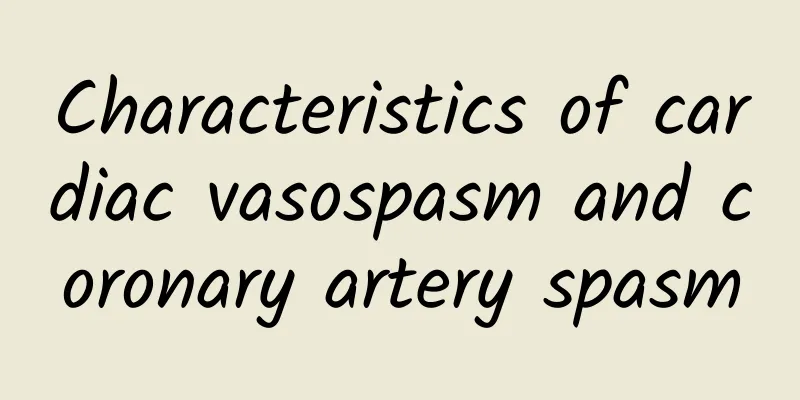Characteristics of cardiac vasospasm and coronary artery spasm

|
Cardiovascular and cerebrovascular diseases are still a common disease, mostly affecting middle-aged and elderly people. Among them, coronary artery spasm is relatively common in life. Although scientific means have not yet figured out the specific pathogenesis, we still need to understand some necessary basics. Clinical features of CAS 1. The clinical characteristics of CAS patients are generally different from those of coronary atherosclerotic heart disease. CAS patients are relatively young and, except for smoking, generally lack traditional cardiovascular risk factors [2]. CAS is prone to occur in a quiet state, often at midnight and early morning. Exercise and excessive ventilation can cause seizures, but the vast majority of patients have a certain activity tolerance; 2. Compared with the ST segment depression during coronary heart disease, the characteristic electrocardiogram during typical CAS is mostly ST segment elevation, and as the spasm is relieved, the ST segment can return to the baseline level within a few minutes; 3. Atypical CAS[3]. This type of patient is mostly middle-aged people with high work and life pressure. The main manifestation is also usually static chest tightness or chest pain. It often occurs in the second half of the night or in a quiet state after fatigue, in an environment with poor air circulation. It manifests as chest tightness and pain, difficulty breathing, and a feeling of pressure in the chest area. However, the degree of symptoms is relatively mild. Sitting up, walking, breathing fresh air, etc. can relieve the symptoms. Sometimes, taking nitroglycerin sublingually can quickly relieve symptoms, and the electrocardiogram during an attack may show T wave changes, ST segment depression, or no myocardial ischemic electrocardiogram changes, and the exercise treadmill test is negative, but the cardiac ECT examination indicates reverse redistribution of myocardial blood flow perfusion. The reason for this ST segment not being elevated may be the collateral circulation established by long-term repetitive spasms or the occlusive spasm is too short, so that although the distal blood vessels are ischemic, they have not reached the degree of damage. 4. CAS attacks can generally be relieved quickly within a few minutes due to the release of spasms, but some severe and persistent CAS may induce arrhythmias and endanger the patient's life. The type of arrhythmia often depends on the blood vessels involved in the spasm. Spasm of the right coronary artery often leads to heart block, while spasm of the left coronary artery often induces malignant ventricular arrhythmias. The mechanism of CAS The mechanism of CAS has not been thoroughly studied yet. Many studies at home and abroad in recent years have shown that it may be closely related to the following mechanisms: 1. Endothelial dysfunction Endothelial cells play an important role in vascular regulation by producing and releasing factors that cause vascular contraction and relaxation. Intact endothelial cells can protect blood vessels, but endothelial damage is prone to spasm, which may be closely related to the defective NO activity of damaged blood vessels and the massive release of endothelin. 2. Increased contractile responsiveness of vascular smooth muscle cells The contraction of vascular smooth muscle depends on the intracellular calcium concentration and the sensitivity of smooth muscle to calcium. When the intracellular calcium ion concentration increases, the calcium ions bind to calcimodulin, leading to the phosphorylation of myosin light chain and the vascular smooth muscle cells showing an over-contracted response to agonists. 3. Oxidative stress Oxidative stress has been shown to be closely related to a variety of cardiovascular diseases. Oxygen free radicals can reduce NO and cause vasoconstriction. 4. Abnormal autonomic nervous system function Acetylcholine can induce CAS, and this effect can be inhibited by atropine or α-receptor blockers. These autonomic nervous function reactions may be closely related to the occurrence of CAS. 5. Genetic susceptibility Abnormalities in the endothelial nitric oxide synthase gene can cause vasoconstriction through decreased nitric oxide release and increased superoxide production. In addition, HLA-DR2 antigen concentrations are significantly increased in CAS patients compared with patients with acute chest pain without seizures [4]. 6. Chronic inflammation The clinical manifestations of CAS are fluctuating and cannot occur consistently under similar circumstances, which may be related to different local inflammatory states. In recent years, many studies at home and abroad have confirmed that the level of serum high-sensitivity C-reactive protein increases significantly during CAS attacks, strongly suggesting that inflammatory factors may be involved in the occurrence of CAS. |
<<: 【One Ai a Day】Go away all gastrointestinal cramps
>>: Which of these foods that soften blood vessels do you know?
Recommend
How to treat coronal sulcus warts?
I believe everyone is familiar with sexually tran...
Pictures of ulcers on the penis
The importance of male genitals to men is obvious...
Why does the testicular bag have blood streaks?
The testicle is a very important male reproductiv...
Paget's disease of the scrotum
Scrotal Paget's disease is also known as scro...
How to treat premature ejaculation in men
Premature ejaculation is the most embarrassing pr...
What causes epididymis swelling and pain?
When a male friend finds that his epididymis is s...
What disease does a man usually have when he wants to vomit?
Vomiting is usually caused by gastrointestinal di...
Revealed: How men can improve their ejaculation control
Men have always hoped that their "fighting p...
Male follicle-stimulating hormone
When talking about follicles, most people probabl...
Causes of vaginal itching in men
The itching of male genitals may be caused by bac...
What is the normal percentage of sperm motility?
We all know that women will release an egg cell e...
Men are more powerful when they masturbate
Every normal man wants to be the strongest at hom...
Causes of small red particles in the coronal groove
What is the matter with the small red particles i...
Married men like your actions
When it comes to liking someone, the way a mature...
Is eczema serious? How can it be treated?
Is eczema a serious disease? According to experts...









